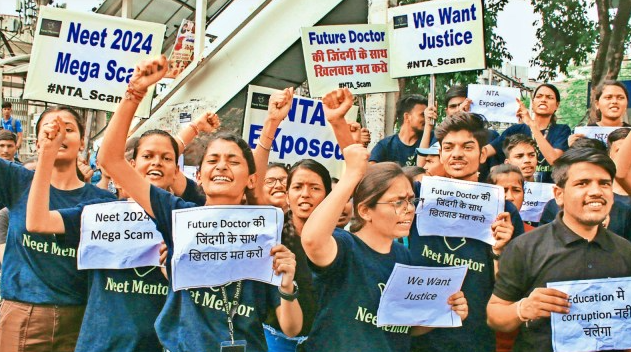The Rot in India’s Higher Education System (GS Paper 2, Social Justice)

Context
- The introduction of the National Testing Agency (NTA)-run Common University Entrance Test (CUET) in 2022-23 led to significant delays in university admissions across India, including at institutions like Jawaharlal Nehru University (JNU), which historically conducted its own entrance exams.
- This shift highlighted tensions between standardized testing mandates and university governance autonomy.
Introduction
- The 2022-23 academic year marked a significant shift in India’s higher education admission processes with the introduction of the CUET by the NTA.
- This new standardized testing regime caused widespread delays and administrative challenges, particularly impacting the traditionally autonomous Jawaharlal Nehru University (JNU).
- The shift from conventional methods to CUET has sparked controversies and raised concerns about the balance between standardization and university autonomy.
Delays and Administrative Challenges
- The implementation of the CUET led to significant delays in PhD admissions, pushing the academic calendar by eight months.
- JNU, known for its rigorous entrance exams, was particularly affected.
- The abrupt cancellation of the CUET for PhD admissions in 2022-23 left universities uncertain and unprepared, exacerbating the delays and creating administrative chaos.
Regulatory Changes and University Autonomy
- The University Grants Commission (UGC) Regulations, 2022, reinstated the rights of universities to conduct their own PhD entrance exams.
- However, several central universities, including JNU, continued to use the NTA for PhD admissions.
- This decision, driven by executive mandates, compromised the academic autonomy of these institutions, despite opposition from faculty and students.
Role of NTA and Executive Decisions
- The NTA’s influence over university admissions extended through executive directives, overriding traditional university practices.
- JNU, renowned for its fair and rigorous entrance exams, faced pressure to adopt the standardized CUET format.
- This shift raised questions about the impact of executive decisions on academic integrity and university governance.
Controversies and Lack of Transparency
- The Ministry of Education and UGC presented contradictory stances on NTA’s involvement in university admissions, creating confusion.
- The lack of documented contracts or agreements between JNU and the NTA further fueled controversy, raising concerns about the transparency and accountability of the decision-making processes.
Impact on Academic Calendar and Governance
- The control exerted by the NTA over university academic calendars disrupted traditional admission timelines, affecting the overall governance of higher education institutions.
- The compliance of vice-chancellors with NTA directives sparked concerns about preserving the autonomy and academic standards of universities.
Call for Reform and Restoration of Autonomy
- Academic bodies and stakeholders are calling for universities to reclaim their autonomy in admissions, particularly for PhD programs.
- There is a pressing need for transparency in decision-making processes to restore confidence among students and faculty in the governance of higher education institutions.
Conclusion
- The challenges posed by the introduction of the NTA-run CUET highlight the need for reforms in India’s higher education system.
- It is crucial to clarify regulatory frameworks and ensure adherence to statutory university processes.
- Restoring autonomy in admissions processes, especially for PhD programs, is essential for maintaining the academic standards and integrity of Indian higher education institutions.
- Reforms should focus on balancing standardized testing with the preservation of university governance autonomy to promote a more effective and equitable education system.


